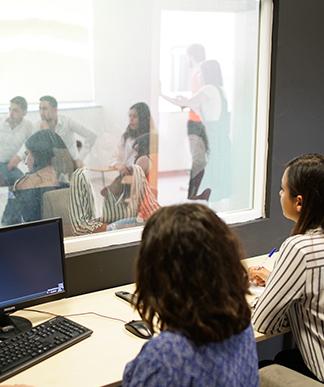


About the Program
Guidance and Psychological Counseling Bachelor’s Program trains individuals who are able to conceptualize human life as a developmental process, integrate professional development and individual development with respect to individual and societal differences, work with various segments of the society, and provide the field's theoretical knowledge and skills. The students who graduate from the program have the knowledge of the basic concepts and principles of the Psychological Counseling and Guidance (PCG) field; they are able to: evaluate the developmental characteristics and problems specific to the life cycle; offer individual and group psychological counseling and guidance services in line with the psycho-social needs of individuals; and have the competence to work in cooperation and individually with their colleagues.
Accreditations
Guidance and Psychological Counselling Program has been accredited by one of the national accreditation organizations, the Association for Evaluation and Accreditation of Teacher Education Programs (EPDAD) and continues its educational activities since 2020.
Education Opportunities
Guidance and Psychological Counseling Undergraduate Program, there are many elective courses in addition to the compulsory courses as part of the main curriculum and it is also important for our students to keep up with current issues related to the field. In the program, there are many course options about group and individual psychological counseling, child abuse, cognitive behavioral therapies, family counseling, scientific research techniques and the like. The Guidance and Psychological Counseling Undergraduate Degree Program offers the widest range of educational opportunities for the students to develop themselves toward becoming a specialist.
The program utilizes the Guidance and Psychological Counseling Implementation Unit, which provides technology classes, computer laboratories and psychological counseling practices where interactive boards are used. In addition to these, our students are provided with the opportunity to access a large number of electronic and printed publications, research and projects in our rich and self-updating library.

Career Areas
Guidance and Psychological Counseling graduates can work as a psychological counselor or guidance counselor in educational institutions, special education institutions, pre-school education institutions, rehabilitation centers, psychological counseling centers of universities, human resource departments of companies, and rehabilitation and counseling centers (RCC) of the Turkish Military Forces. Our graduates can also have private office upon completing the postgraduate studies they want to specialize in.
Our graduates can conduct scientific studies, have publications, and participate in symposiums and conferences during the undergraduate program or after graduation. Current students and graduates are taking firm steps in their career path by taking positions in associations and non-governmental organizations relevant to their profession.
Contact
Faculty of Education
Çevik Uraz Center, CU 237
Tel: +90 392 671 1111 Extension: 2701
Faculty E-mail: secretary-foe@ciu.edu.tr
Acting Head of Department: Asst. Prof. Dr. Sevinç KAÇAR
Head of Department E-mail: skacar@ciu.edu.tr
Compulsory Courses
First Semester
INFORMATION TECHNOLOGIES
Course code
BILT123Credit
3Theoretical
3Practical
0Ects
5SOCIOLOGY OF EDUCATION
Course code
EGIT111Credit
2Theoretical
2Practical
0Ects
3INTRODUCTION TO EDUCATION
Course code
EGIT121Credit
2Theoretical
2Practical
0Ects
3KÜLTÜREL ANTROPOLOJI
Course code
EGIT344Credit
2Theoretical
2Practical
0Ects
4ENGLISH LANGUAGE-I
Course code
INGL151Credit
2Theoretical
2Practical
0Ects
3INTRODUCTION TO PSYCHOLOGY
Course code
PSKO121Credit
2Theoretical
2Practical
0Ects
4ATATÜRK PRINCIPLES AND HISTORY OF TURKISH REFORMS-I
Course code
TARH101Credit
2Theoretical
2Practical
0Ects
3TURKISH LANGUAGE - I
Course code
TREG121Credit
2Theoretical
2Practical
0Ects
5Second Semester
PHILOSOPHY OF EDUCATION
Course code
EGIT104Credit
2Theoretical
2Practical
0Ects
3TEACHING TECHNOLOGIES
Course code
EGIT233Credit
2Theoretical
2Practical
0Ects
3ENGLISH LANGUAGE-II
Course code
INGL152Credit
2Theoretical
2Practical
0Ects
3PHYSIOLOGICAL PSYCHOLOGY
Course code
PSKO122Credit
2Theoretical
2Practical
0Ects
4DEVELOPMENTAL PSYCHOLOGY-I
Course code
PSKO124Credit
2Theoretical
2Practical
0Ects
4GUIDANCE AND PSYCHOLOGICAL COUNSELING IN SCHOOLS
Course code
REPD126Credit
2Theoretical
2Practical
0Ects
5ATATÜRK PRINCIPLES AND HISTORY OF TURKISH REFORMS-II
Course code
TARH102Credit
2Theoretical
2Practical
0Ects
3TURKISH LANGUAGE-II
Course code
TREG122Credit
2Theoretical
2Practical
0Ects
5Third Semester
PRINCIPLES AND METHODS OF TEACHING
Course code
EGIT206Credit
2Theoretical
2Practical
0Ects
3FACULTY ELECTIVE
Course code
EGITXX1Credit
2Theoretical
2Practical
0Ects
4STATISTICS
Course code
ISTA311Credit
2Theoretical
2Practical
0Ects
4SOCIAL PSYCHOLOGY
Course code
PSKO221Credit
2Theoretical
2Practical
0Ects
4LEARNING PSYCHOLOGY
Course code
PSKO223Credit
2Theoretical
2Practical
0Ects
4DEVELOPMENTAL PSYCHOLOGY-II
Course code
PSKO225Credit
2Theoretical
2Practical
0Ects
4AREA ELECTIVE
Course code
REPDXX1Credit
2Theoretical
2Practical
0Ects
4ÜNİVERSİTE SEÇMELİ
Course code
UNISXX1Credit
2Theoretical
2Practical
0Ects
3Fourth Semester
HISTORY OF TURKISH EDUCATION
Course code
EGIT222Credit
2Theoretical
2Practical
0Ects
3RESEARCH METHODS IN EDUCATION
Course code
EGIT227Credit
2Theoretical
2Practical
0Ects
3FACULTY ELECTIVE
Course code
EGITXX2Credit
2Theoretical
2Practical
0Ects
4CHARACTER AND VALUE EDUCATION
Course code
OOEG428Credit
2Theoretical
2Practical
0Ects
3NON-TEST TECHNIQUES
Course code
REPD222Credit
2Theoretical
1Practical
2Ects
3THEORIES OF PERSONALITY
Course code
REPD224Credit
2Theoretical
2Practical
0Ects
2LIFE STAGES AND ADAPTATION PROBLEMS
Course code
REPD226Credit
2Theoretical
2Practical
0Ects
2AREA ELECTIVE
Course code
REPDXX2Credit
2Theoretical
2Practical
0Ects
4COMMUNITY SERVICE PRACTICES
Course code
SOSH100Credit
2Theoretical
1Practical
2Ects
3ÜNİVERSİTE SEÇMELİ
Course code
UNISXX2Credit
2Theoretical
2Practical
0Ects
3Fifth Semester
MEASUREMENT AND EVALUATION IN EDUCATION
Course code
EGIT224Credit
2Theoretical
2Practical
0Ects
3TURKISH EDUCATION SYSTEMS AND SCHOOL MANAGEMENT
Course code
EGIT326Credit
2Theoretical
2Practical
0Ects
3FACULTY ELECTIVE
Course code
EGITXX3Credit
2Theoretical
2Practical
0Ects
4VOCATIONAL GUIDANCE
Course code
REPD229Credit
2Theoretical
2Practical
0Ects
2PSİKOLOJİK DANIŞMAN İLKE VE TEKNİKLERİ
Course code
REPD321Credit
2Theoretical
2Practical
0Ects
3PSYCHOLOGICAL TESTING
Course code
REPD323Credit
2Theoretical
1Practical
2Ects
3BEHAVIORAL DISORDERS-I
Course code
REPD325Credit
2Theoretical
2Practical
0Ects
3PSİKOLOJİK DANIŞMA KURAMLARI
Course code
REPD327Credit
2Theoretical
2Practical
0Ects
2AREA ELECTIVE
Course code
REPDXX3Credit
2Theoretical
2Practical
0Ects
4UNIVERSITY ELECTIVE
Course code
UNISXX3Credit
2Theoretical
2Practical
0Ects
3Sixth Semester
CLASSROOM MANAGEMENT
Course code
EGIT301Credit
2Theoretical
2Practical
0Ects
3MORALITY AND ETHICS IN EDUCATION
Course code
EGIT323Credit
2Theoretical
2Practical
0Ects
3FACULTY ELECTIVE
Course code
EGITXX4Credit
2Theoretical
2Practical
0Ects
4GROUP COUNSELING
Course code
REPD320Credit
2Theoretical
2Practical
0Ects
3PSYCHOLOGICAL COUNSELING SKILLS
Course code
REPD322Credit
2Theoretical
1Practical
2Ects
4VOCATIONAL GUIDANCE PRACTICES
Course code
REPD324Credit
2Theoretical
1Practical
2Ects
2BEHAVIORAL DISORDERS-II
Course code
REPD326Credit
2Theoretical
2Practical
0Ects
2SPIRITUAL CONSULTANCY
Course code
REPD328Credit
2Theoretical
2Practical
0Ects
2AREA ELECTIVE
Course code
REPDXX4Credit
2Theoretical
2Practical
0Ects
4ÜNİVERSİTE SEÇMELİ
Course code
UNISXX4Credit
2Theoretical
2Practical
0Ects
3Seventh Semester
INCLUSION IN SPECIAL EDUCATION
Course code
EGIT423Credit
2Theoretical
2Practical
0Ects
3FACULTY ELECTIVE
Course code
EGITXX5Credit
2Theoretical
2Practical
0Ects
4COUNSELING PRACTICES IN SCHOOLS-I
Course code
REPD421Credit
5Theoretical
2Practical
6Ects
10PROFESSIONAL ETHICS AND LEGAL ISSUES
Course code
REPD425Credit
2Theoretical
2Practical
0Ects
2CURRICULUM DEISIGN IN GUIDANCE AND PSYCHOLOGICAL COUNSELING
Course code
REPD427Credit
2Theoretical
2Practical
0Ects
2FAMILY COUNSELING
Course code
REPD429Credit
2Theoretical
2Practical
0Ects
2APPLICATIONS OF INDIVIDUAL COUNSELING-I
Course code
REPD431Credit
2Theoretical
1Practical
2Ects
3AREA ELECTIVE
Course code
REPDXX5Credit
2Theoretical
2Practical
0Ects
4Eighth Semester
FACULTY ELECTIVE
Course code
EGITXX6Credit
2Theoretical
2Practical
0Ects
4CHILD LAW
Course code
HKUK320Credit
2Theoretical
2Practical
0Ects
3GUIDANCE AND PSYCHOLOGICAL COUNSELING PRACTICES IN SCHOOLS-II
Course code
REPD422Credit
5Theoretical
2Practical
6Ects
10PSYCHOLOGICAL COUNSELING AFTER TRAUMA
Course code
REPD426Credit
2Theoretical
2Practical
0Ects
3SEMINAR IN GUIDANCE AND PSYCHOLOGICAL COUNSELING
Course code
REPD428Credit
2Theoretical
2Practical
0Ects
3APPLICATIONS OF INDIVIDUAL COUNSELING-II
Course code
REPD432Credit
2Theoretical
1Practical
2Ects
3AREA ELECTIVE
Course code
REPDXX6Credit
2Theoretical
2Practical
0Ects
4Elective Courses
FAMILY COUNSELLING
Course code
REPD409Credit
3Theoretical
3Practical
0Ects
2COGNITIVE BEHAVIOUR PSYCHOLOGICAL COUNSELING
Course code
REPD407Credit
3Theoretical
3Practical
0Ects
4CHILD ABUSE
Course code
RPD215Credit
3Theoretical
3Practical
0Ects
4CAREER PLANNING AND DEVELOPMENT
Course code
EGIT215Credit
2Theoretical
2Practical
0Ects
3TEACHING SOCIAL ADAPTATION SKILLS IN SPECIAL EDUCATION
Course code
OZEG312Credit
3Theoretical
3Practical
0Ects
4FAMILY RELATIONS AND COMMUNICATION
Course code
REPD354Credit
2Theoretical
2Practical
0Ects
4ADDICTION AND ADDICTION STRUGGLE
Course code
EGIT361Credit
2Theoretical
2Practical
0Ects
3DRAMA IN EDUCATION
Course code
EGIT346Credit
2Theoretical
2Practical
0Ects
4ADDICTION TRAINING IN THE FAMILY
Course code
REPD356Credit
2Theoretical
2Practical
0Ects
4CHILD ABUSE AND NEGLECT
Course code
REPD342Credit
2Theoretical
2Practical
0Ects
4SCIENCE AND RESEARCH ETHICS
Course code
TEIB220Credit
2Theoretical
2Practical
0Ects
3COMPARATIVE EDUCATION
Course code
EGIT353Credit
2Theoretical
2Practical
0Ects
4MEDIA LITERACY
Course code
BOTE359Credit
2Theoretical
2Practical
0Ects
Psychological Counseling for Children and Adolescents
Course code
REPD441Credit
2Theoretical
2Practical
0Ects
4Preventive Guidance and Psychological Counseling
Course code
REPD347Credit
2Theoretical
2Practical
0Ects
4ADULT EDUCATION AND LIFELONG LEARNING
Course code
EGIT360Credit
2Theoretical
2Practical
0Ects
4CURRICULUM DESIGN IN EDUCATION
Course code
EGIT335Credit
2Theoretical
2Practical
0Ects
3MENTAL HEALTH IN SCHOOL SETTINGS
Course code
REPD346Credit
2Theoretical
2Practical
0Ects
4SHORT-TERM COUNSELLING
Course code
REPD345Credit
2Theoretical
2Practical
0Ects
4JUVENILE LAW
Course code
REPD316Credit
3Theoretical
3Practical
0Ects
3SPECIAL EDUCATION IN EARLY CHILDHOOD
Course code
OZEG112Credit
3Theoretical
3Practical
0Ects
6SUPPORTING LANGUAGE AND COMMUNICATION SKILLS
Course code
OZEG202Credit
3Theoretical
3Practical
0Ects
4ENVIRONMENTAL EDUCATION IN EARLY CHILDHOOD
Course code
OOEG352Credit
3Theoretical
3Practical
0Ects
5EARLY CHILDHOOD EDUCATION POLICIES
Course code
OOEG454Credit
2Theoretical
2Practical
0Ects
5.
Course code
OZEG377Credit
2Theoretical
2Practical
0Ects
4CHILD MENTAL HEALTH
Course code
OOEG315Credit
2Theoretical
3Practical
0Ects
3CHILD DEVELOPMENT
Course code
OOEG116Credit
3Theoretical
3Practical
0Ects
5TECHNOLOGY AND ADULT EDUCATION
Course code
BOTE362Credit
2Theoretical
2Practical
0Ects
4HAPPINESS
Course code
EGIT424Credit
2Theoretical
2Practical
0Ects
3SPEECH AND LANGUAGE DISORDERS
Course code
OZEG243Credit
3Theoretical
3Practical
0Ects
5TR Applicants
TR Students who are successful in the exams conducted by the Higher Education Council Student Selection and Placement Center (ÖSYM) and are entitled to enroll in our university in line with their preferences can complete the registration process with the necessary documents for registration from our Registration and Liaison Offices throughout Turkey or from the Registrar's Office on campus.
Click for detailed admission requirements information.
TRNC Applicants
TRNC citizens and TR citizen candidate students who have completed their entire high school education in TRNC. They are placed in undergraduate programs in line with their success in the CIU Student Placement and Scholarship Ranking Exam and the programs they prefer.
Students who are successful in the exam can register from the TRNC Marketing Office.
Tuition Fees are determined at the beginning of each academic year. Candidate students who are entitled to enroll in CIU can learn their fees in line with the Tuition Fee Calculation system.